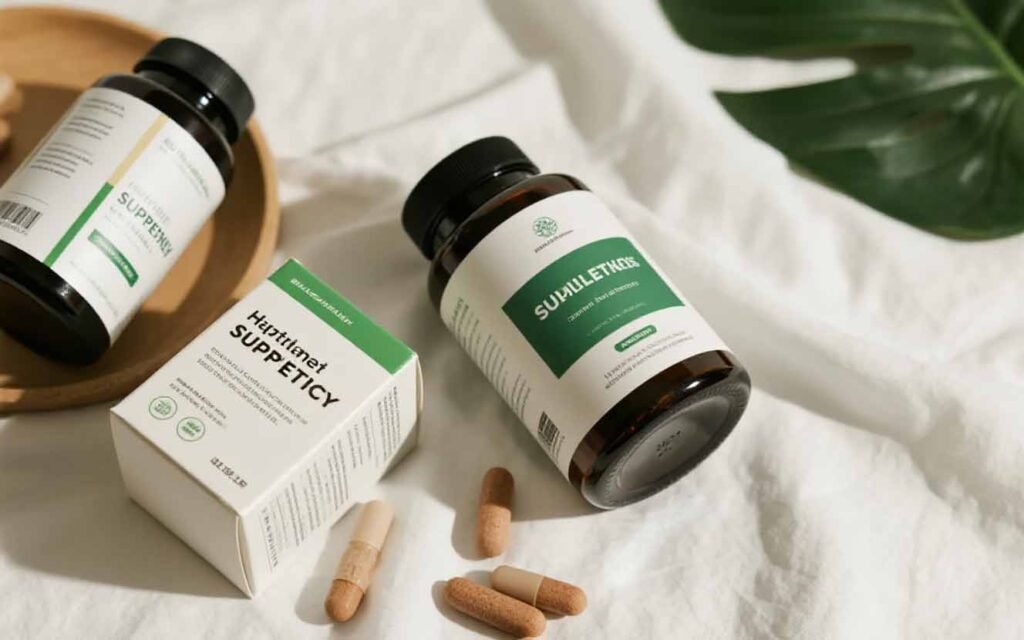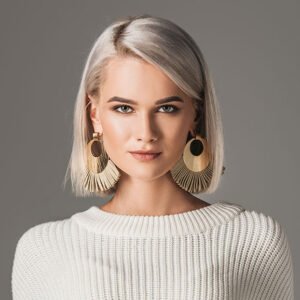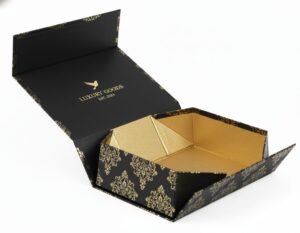
Majority of the people typically think of the advantages of supplements first, such as increased energy, cleaner skin, stronger immunity, or just being healthier all over. But, have you ever thought about how much a customer’s choice might be influenced by the proper packing for health products?
The truth is, the wrapping protects your product, communicates your brand story, and even builds trust with your customers.
We’ll go over the top options for health supplement packaging, their significance, and how to pick the ideal custom supplement packaging for your company in this guide.
Why Packaging Matters for Supplements
Imagine browsing an internet supplement store or going down the aisle of a health store. Your eyes catch two brands of the same vitamin. One comes in a plain, flimsy bottle with a generic label. The other comes in a stylish, well-made vitamin box that is tightly sealed and has good labeling. Which would you choose? Chances are, the second one.
Wrapping for supplements is crucial for branding, convenience, safety, and trust.
The container you select can create or shatter the first impression, regardless of whether you are making multivitamins, protein powders, or herbal supplements.
Types of Supplement Packaging
There is not a solution that works for everyone.Your product kind, target market, and financial constraints will all influence the ideal supplement wrapping. Let’s examine the most well-liked choices.
1. Bottles
They are the most common form of supplements packaging, especially for capsules and tablets.
Pros:
- Airtight and resistant to moisture
- Easy to label and brand
- Economical for large quantities
Cons:
- Not always eco-friendly
- Limited design flexibility
Tip: Use plastic or amber glass to shield supplements from light deterioration.
2. Pouches
Resealable packets are a flexible form of custom supplement packaging for powders, gummies, and single-serving portions.
Pros:
- Compact and lightweight, which lowers shipping expenses
- Simple to reseal, maintaining the freshness of supplements
- Able to have windows that are transparent for visibility
Cons:
- Extra caution may be required to avoid crushing because they are less rigid
- Frequently calls for laminated layers, which can make recycling more difficult
Supplement packaging companies who specialize in creating pouches that are both aesthetically pleasing and functional are frequently chosen by health product brands.
3. Boxes (Vitamin Boxes)
Custom vitamin boxes allow brands to combine protection, style, and information in one package. These are ideal for subscription services, gift sets, or premium products.
Pros:
- Excellent for custom supplement packagingand branding
- Can have trays or inserts to store
- Provide plenty of room for health claims and regulatory details
Cons:
- A little more expensive
- Requires precise measurements to prevent movement inside the box
If you want to make a statement on shelves or in e-commerce, health supplement packaging boxes are a great choice.
4. Blister Packs
Blister packs are perfect for single-dose capsules or tablets. They are commonly used in pharmaceuticals but are gaining traction in the supplement industry.
Pros:
- Individual servings reduce dosage errors
- Tamper-evident and hygienic
- Easy for travel and on-the-go consumption
Cons:
- Limited space for branding
- Production cost can be higher than bottles or pouches
Blister packs can be paired with vitamin boxes for premium presentation.
5. Combination Packaging
Some brands employ a multi-layered strategy by combining bottles, blister packs, and cartons. For instance, a company that packages health products may supply capsules in pill packs, which are then arranged in a custom supplement box with an informative insert.
This strategy enhances the unboxing experience and raises perceived value, particularly for e-commerce firms.
Materials to Consider
Selecting the appropriate material is crucial for sustainability and protection.
| Material | Best For | Pros | Cons |
|---|---|---|---|
| Glass | Capsules, tablets | Airtight, premium feel | Heavy, fragile |
| Plastic (HDPE, PET) | Capsules, gummies | Lightweight, durable, recyclable | Environmental concerns |
| Foil Laminates | Powders individual servings | Barrier against moisture & oxygen | Harder to recycle |
| Paperboard | Boxes for bottles or pouches | Customizable, printable, eco-friendly | Needs inserts for protection |
Manufacturers of high-quality supplement packaging frequently provide advice on material selection depending on product type, shelf-life specifications, and sustainability objectives.
Design Features That Make a Difference
Consider more than just the container when choosing customized pill cartons. These qualities can improve attractiveness and usability.
- Resealable closures:keeps powders and gummies fresh
- Window panels:allow customers to see the product inside the vitamin boxes
- Tamper-evident seals:builds trust, especially for e-commerce
- Color and typography:reflects brand identity and attracts attention
- Informational panels:clearly list ingredients, dosage instructions, and health benefits
Simple design changes can boost repeat business and consumer satisfaction.
Choosing a Supplement Packaging Company
A supplement packaging company does more than print boxes or bottles, they provide expertise in materials, regulatory compliance, and brand storytelling.
Many companies choose collaborating with supplement packaging producers who can manage small and large quantities, benefiting both new and well-known brands.
Sustainability Considerations
Consumers are increasingly eco-conscious. Sustainable wrapping for supplements can be a major selling point.
- PETor HDPE jars that can be recycled
- Boxes composed of paperboard and recycled materials
- Laminates that reduce the usage of plastic
- Containers that are refillable or reusable
Brands that highlight eco-friendly materials in their marketing often see higher trust and brand loyalty.
Pricing Factors
Cost is always a factor in selecting supplements packaging.
- Production volume:higher volumes usually reduce unit costs
- Material choice:glass and specialty laminates cost more than standard plastics or paperboard
- Customizations:embossing, foil stamping, and specialty printing increase production costs
- Shipping and storage:lightweight packaging like pouches reduces logistics expenses
A lot of supplement packaging manufacturers provide financial breakdowns to help organizations make informed decisions.
Trends in Supplement Packaging
- Subscription-friendly packs:brands are increasingly using vitamin boxes for monthly subscriptions
- Minimalist design:consumers who are health-conscious are drawn to simple layouts with obvious labeling
- Functional packaging:resealable pouches, portion-controlled packs, and pre-dosed capsules make supplements more convenient
- Eco-conscious Container:biodegradable inserts, recycled materials, and less plastic are becoming commonplace
Staying ahead of these trends can help your brand stand out in a crowded market.
Choosing the Best Packaging for Your Supplements
In the end, the ideal health product containers strike a balance between brand expression, security, and functionality.
| Product Type | Recommended Packing | Key Benefits |
|---|---|---|
| Capsules & tablets | Bottles, blister packs | Protection, portion control, shelf-ready |
| Powders & protein | Resealable pouches, bottles | Freshness, convenience, lightweight |
| Gummies | Bottles, custom vitamin boxes | Visibility, branding, tamper-evidence |
| Premium / gift sets | Custom supplement boxes with inserts | Shelf appeal, brand storytelling, giftable |
By choosing the appropriate custom supplement container, you can improve the reputation of your business and guarantee that your products arrive at customers in optimal shape.
Conclusion
For every product, there isn’t a single “best” way to package supplements. Your target audience or market, brand positioning, health product type, and sustainability objectives will all influence the best wrapping. The proper personalized product packaging improves customer happiness, safety, and trust.
Consider teaming up with a seasoned business that specializes in packing supplements which also provides services from design to delivery if you want to improve the appeal of your product and leave a lasting impression.
Ready to Level Up Your Supplement Packaging?
Packaging for your supplements should inspire, sell, and protect. Reach out to us right now to create unique solutions that capture the essence of your brand’s values and goals. The correct packing can make a noticeable difference, whether you’re introducing a new product or redesigning the package for an existing health supplement.

